Protection for Sexual Orientation and Gender Identity – A Paper
POSTED on Dec 01, 2012.
If Uganda legislates its new proposed Anti-Homosexuality Bill it may find itself in international hot water; and those in high authority who support and enforce it may find themselves accused of crimes against humanity, unable to travel internationally, with international arrest warrants and perhaps tried in international tribunals. They may well turn out to be the real criminals. There is only so much one can claim in the name of sovereignty; incitement to genocide is not one. Read this paper-
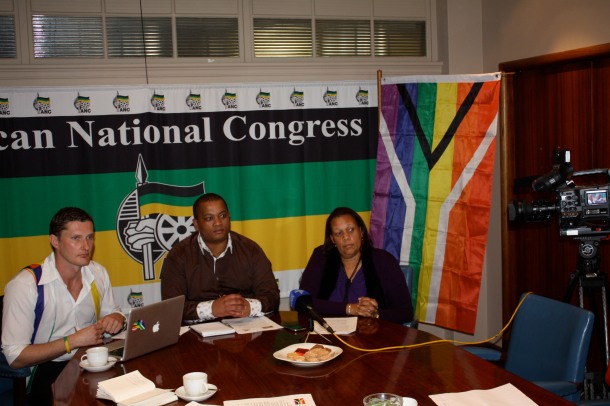
GFSA Conference with ANC Photo: Eugene Brockman, © Cape Town 2012
Under The African Charter on Human and Peoples’ Rights
(NOTE: This paper was written by various international groups, including the Centre for Human Rights, University of Pretoria, South Africa, in 2008. It was requested by the African Commission on Human & Peoples’ Rights.)
A Discussion Document
The African Commission on Human and Peoples’ Rights has valiantly embraced its role in the realization of the ideals and protections set forth in the landmark African Charter, notably ratified by every state in Africa. Interpreting the extensive range of rights embodied in the Charter though insightful jurisprudence and the establishment of thematic working groups, such as that on indigenous peoples, the Commission has taken its rightful place in the national, regional and, increasingly, international human rights dialogue.
There is, however, a glaring exception in the application of the Charter’s principles of non-discrimination and equality to a considerable minority of peoples on the Continent: those of same-sex sexual orientation[1] and different gender identity.[2] Accordingly, this paper explores the cultural and legal issues relevant to these members of the community with an eye toward inclusion of this significant topic in the Commission’s agenda. [3]
- Relevance to the Commission
1.1 The extensive abuse of peoples across Africa based on their same-sex sexual orientation and non-conforming gender identity by state and private actors is well documented.[4] These acts take many forms including: verbal abuse, physical attacks, arbitrary arrest and detention, unfair trials, discrimination in education, housing, employment, access to health care, and most outrageously, murder via vigilante and extra-judicial executions and imposition of the death penalty.
1.2 Most states perpetrate discrimination by criminalizing sexual acts between same-sex partners, generally by outlawing sodomy, but sometimes by expressly criminalizing male-to-male sexual acts.[5] Those same laws in turn, are generally used as pretexts for general arrests of gay men (primarily) gathered in public or private places even when not engaged in sex. In such cases, it is even clearer that the governmental action is purely based on “status” and not actual criminalized activity, but rather, is designed to prevent assembly and political voice and cohesion.
1.3 Private abuse, in turn, is often based primarily on perceptions of same-sex sexual orientation presumed by virtue of a person’s personal appearance and non-conformity with gender roles (i.e., men who appear effeminate, wear makeup, or are not interested in women, or women who wear masculine clothing or have short hair), or, by virtue of a person’s proximity to establishments or areas commonly known to be patronized by gay, lesbian, bisexual or transgendered people.[6] More broadly, political and religious actors often vilify the “status” thereby fuelling the general public’s hatred and inciting violence.
1.4 A few examples include:
- In Senegal in February 2008 ten people were arrested on the presumed basis of their sexual orientation based on a photograph taken over a year earlier at a private wedding reception. Following their temporary release, a group of 15 Islamic organizations issued a press release calling for the stoning of gay people throughout the country that resulted in mob and vigilante attacks.
- In Cameroon, Nigeria and Uganda, administrators, teachers and other students have chased gay and lesbian youth away from their schools at both the secondary and tertiary levels.
- In Botswana and Sierra Leone, LGBT people have been denied the right to register their non-profit associations. In other countries, LGBT organizers, fearing exposure, do not even attempt to obtain official registration.
- In Uganda, the government has consistently attempted to limit freedom of expression with regard to sexual orientation and gender identity through the imposition of fines and bans against journalists, theatre groups, and media organs as well as threats of arrest levelled at human rights defenders.
- In Cameroon, eleven men spent more than a year in prison before seven of them were convicted on sodomy charges in 2006. One man, Alim Mongoche, died within a week of his release due to the conditions of detention.[7]
- In Botswana in 1995, two men were arrested and convicted on sodomy charges stemming from a private sexual act. [8]
- In nearly every African country, extortion and blackmail of LGBT, often with the participation of security forces, has been documented. Often the Internet is used to entrap gay and bisexual men, and to lure them into plots in order to blackmail them. Dozens of men have been robbed and beaten in the process.
- Sudan, Nigeria and Mauritania maintain the death penalty for consensual homosexual acts. There have been several trials in Northern Nigeria in the last five years in which the death penalty was the proposed punishment.
- In South Africa in the past five years more than a dozen lesbians have been murdered with few arrests and little government protection. [9]
- In Kenya, Cameroon, Namibia, Uganda, South Africa, and Zimbabwe senior government figures officials and notable civic figures have made statements vilifying homosexuals and labelling their existence as ‘un-African’,[10] leading in turn to their harassment.[11]
1.5 The fact that a serious problem exists is, alternatively, indicated by the fact that some countries have taken aggressive steps to address it. In particular, the African National Congress supported the inclusion of “sexual orientation” as a protected status in South Africa’s 1996 Constitution, reportedly in part because its leadership had gay representation, such as Simon Nkoli, a co-defendant in the anti-apartheid Delmas Trial.[12] Based on that Constitution, South Africa’s Constitutional Court has subsequently found that laws criminalizing consensual same-sex activity were unconstitutional because they were discriminatory, and ultimately, that same-sex unions must be sanctioned by civil laws pertaining to marriage under the elemental premise of equality under the law.[13] Equally cognizant of the reality of the presence of GLBT people and oppression in Africa, there are numerous groups engaged in the struggle for human and peoples’ rights across the Continent and internationally, all working actively to end the clear and widespread discrimination and abuse of this segment of society.[14] Of paramount relevance, Desmond Tutu himself recently co-authored a letter proclaiming the responsibility of Uganda in particular to protect the GLBT community, along with 128 other religious leaders.[15] Despite these efforts, however, human rights defenders advocating the rights of sexual minorities are themselves often harassed, while most civil society organizations tacitly endorse this reality by their failure to condemn it.
- The African Charter on Human and Peoples’ Rights.
2.1 The Charter protects against discrimination, the right of freedom of assembly and expression for all individuals.
The rights enshrined in the African Charter are recognized and guaranteed to “every individual” “without distinction of any kind such as race, ethnic group, color, sex, language, religion, political or any other opinion, national or social origin, fortune, birth or other status”. [16] In fact, the concept of “every individual” and “every human being” is a constant refrain throughout the African Charter, evidencing the primacy of the obligation to protect individual rights, which is itself a fundamental expression of the collective will.
Hence discrimination against “individuals” based upon their status of being “same-sex oriented” or “differently gendered” triggers both specific and general protections. To begin with, the status of “sex” is applicable in that “sex” pertains to the biological and physiological characteristics that define men and women. Elementary to this issue is the internal and true nature of one’s sexual identity (i.e., the sex someone actually is), as opposed to an external physical determination.[17] Equally connected to this equation is the intimate issue of sexual attraction, which lies at the root of human sexuality and is evidenced by the physiologically based sexual arousal and climax in both men and women. As such, “sex” rightly construed encompasses the concepts of sexual orientation and gender identity.[18]
Beyond this proposition, inclusion of the phrase “or other status” in the African Charter provides ample grounds for applying its provisions to eradicate the legal and physical abuse of GLBTI people. A prima facia reading of the list that begins with “such as” instructs that the listed grounds were examples, that the provision was not exhaustive, and that the Charter contemplated its own endless evolution, though not without limitation.
Reason and precedent dictates that inclusion of a newly delineated, unspecified ground should occur when it relates to a characteristic equally inherent to human dignity and the discrimination against people in that group is in a manner similarly serious and comparable to the impact related to the statuses already listed.[19] The categories of race, sex and colour particularly instruct this analysis given their acceptance as naturally occurring and immutable characteristics instinctively known to be analogous to sexual orientation, which science is verifying to be a phenomenon of nature, biologically-based and immutable.[20] Even if it were argued to be a choice of environmental socialization,[21] it is nevertheless undisputedly and intimately associated with individual identity and personal dignity, making its protection imperative.
Even more fundamentally, however, the African Charter protects freedom of assembly and at its most imperative, precludes discrimination and government oppression designed to circumvent “political or other political opinion”. It is beyond doubt that most of the abuse perpetrated by governments against GLBT stems from their exercise of this most fundamental and staunchly protected right. GLBT people congregate for social and political support so that they can organize to effectuate change in the cultural, religious and legal constructs that deny them their right to exist. Clearly, governments understand that this is the most important oppressive step they can take. By arresting them for congregating they effectively deter any effort to organize politically and to share and cultivate political opinions. Regardless of any other stance taken, this situation must be confronted by any organization dedicated to human rights.
Sadly, it is clear that governments use laws against same-sex sexual activity, theoretically designed to proscribe male-male sex, to discriminate against all people based on their status as “same-sex oriented.” The discriminatory laws in turn are actually brandished as a weapon of fear, reminiscent of the Nazi military state, to oppress the basic right of freedom of expression “vital to an individual’s development and political consciousness, and participation in the conduct of public affairs in his country.”[22] Like a military state, this oppression is perpetrated by unwarranted, random raids and arrests of people in lawful public assembly, thus, insidiously violating the fundamental provisions, spirit and intent of the African Charter.
2.2 Limitations to the exercise of rights protected by the African Charter.
Working from the position that the African Charter protects the rights of all people, including GLBT people, to be free from discrimination, and to freedom of expression and assembly, the question arises as to the extent to which those rights can be limited in their exercise by a particular segment of people pursuant to Article 27 which rightfully requires “due regard to the rights of others, collective security, morality and common interest.”
2.2.1 In the context in which this can arise — where a state seeks to limit an established right – it is established that the circumscription must be “strictly proportionate with and absolutely necessary for the advantages that are to be obtained”[23] and most importantly, “may not erode a right such that the right itself becomes illusory.”[24] This substantial standard, which itself reflects an expression of the collective morality and common interest, acknowledges the primacy of the individual and his or her rights while allowing for consideration of broader social concerns. Although there have been no cases challenging the rights of the Charter as applied to protect the individuals at issue here, reference to analogous cases as well as general awareness of cultural attitudes in Africa gives rise to two potential grounds, one based on “morality” and the second on a “common interest.” These are: (a) whether African morality and traditional values requires discrimination against GLBT people and, related thereto, whether the “moral majority” can dictate the rights of the minority; and, (b) whether preventing the spread of HIV is a legitimate interest that warrants outlawing sodomy along with its discriminatory impact.
2.3.1 African morality as determined by traditional and family values.
As a preliminary and somewhat legalistic matter, it is difficult to conceive of a limitation on the right to be free from discrimination that would not “erode [the] right such that the right itself becomes illusory.” Nevertheless, it is important to explore the nature of claims pertaining to African morality.
A distinction between contemporary and political prejudice and traditional values is relevant. It is true that several high-profile African politicians have vilified gay and lesbians, and their lives, claiming that their existence is “un-African.”[25] Moreover, it is reasonable to take judicial notice of the fact that this vilification has taken hold, as is demonstrated by the extent and nature of the private abuse directed at these groups (as mentioned above). It is also noteworthy that there is a proliferation of laws designed to stop GLBT people from having private sexual relationships and to allow for regular attacks on their freedom of assembly. However, it is equally of interest that Desmond Tutu, a truly respected leader, is raising his voice to proclaim the “African-ness” of tolerance and mutual respect while calling upon African nations to cease their attack on this community.
Nevertheless, the Charter does not refer to or incorporate such colonial-period laws or the views of current individual politicians, who themselves hold power in a period of corruption and unrest, nor does it vest with them the role of determining African values. To the contrary, the African Charter for Human and Peoples’ Rights imbues and recognizes the family as the “custodian of morals and traditional values recognized by the community” and thus, the question of what constitutes African values in this context is much harder to distill.[26]
Historically, it is firmly established that same-sex activity between consenting adults has long-existed in African society.[27] Furthermore, the mere degree of political discourse, literature, international attention, not to mention the attacks and the political statements referenced above, demonstrate beyond a doubt that gays, lesbian, bisexual and transgendered people exist throughout Africa today.[28] In this sense, to the extent that it exists – not in an isolated bubble, but peppered throughout family life — any presumption that it is antithetical to or rejected by family values is tenuous at best.[29] Beyond this evident truth, there is also no doubt many young boys and girls vary from extremes of femininity or masculinity yet live productive lives as loved members of their society. People are different in this respect and it is an odd suggestion, and an unnatural outcome, that family values would reject the continuum of humanity.
Even if such a leap is made to assume that contemporary prejudice (even if embraced by the majority) against GLBT people constitutes a “traditional African value”, the question remains whether criminalizing same-sex acts is “necessary” or even related to furthering such a “value.” As a factual matter, given that many of these laws have existed through colonial times, it is clear that they have not prevented homosexuals from existing, gathering, loving and being productive members of society. Taken in this light, the laws are more rightly exposed as a means of punishment and a tool to oppress the rights of freedom of expression and association.
Equally important, the analysis of community morality also involves the query into whether there are contravening African values such as that of tolerance for diversity and minorities that negate or override such a negative value. There are, in fact, thousands of ethnic groups in Africa, sliced across state boundaries, which enrich Africa as a multi-lingual, multi-ethnic, multi-religious, intermixed, increasingly international, and inevitably, universal society. Given the history and current ethnic conflict (which, like sodomy laws, are vestiges of colonialism), there is more evidence to support an assertion that Africa has a tradition of ethnic conflict than homophobia. However, no one would argue that such a tradition should trump a value founded in tolerance of our differences. Rightfully, institutions entrusted with Africa’s future may, and one might say, must, reject those traditions of the past that contradict preemptory norms of humanity, that are regressive, and which counter efforts toward a hopeful and peaceful tomorrow. In line with this approach, the existence of sexual minorities are just another layer of diversity among African societies that further justifies the call for tolerance of diversity and its securitization by the African Charter.
2.3.2 A Majority View of Morality Is Not Necessarily Determinative.
Related to the question of “morality” is the more fundamental question of whether and to what extent the majority may impose its values on minorities who do not share them, or who by their very existence defy the majority’s opinion of what should be. This question often becomes intermingled with questions of democracy, and what most often confuses this discussion is a misunderstanding of the nature of democracy, which is not only a representative voting mechanism to elect (and get rid of) leaders, but is more fundamentally premised on a set of ideals, themselves reflective of the majority opinion by virtue of their enshrinement in a constitutional document. This is equally true of the African Charter as a constitutive document and the balance it struck between protecting the individual and certain specified rights, and the inclusion of considerations for limiting those rights by reference to broader social opinions. Hence understanding the relative role of majority opinion and its underpinnings is both important and relevant.
Pertaining to this question, The African Commission has already made it clear that interpretation of the Charter cannot be conclusively determined by reference to the views of the majority, particularly when those views are discerned from seemingly representative acts of its legislatures. In Legal Resources Foundation v Zambia the Commission held that justification of limitations “cannot be derived solely from popular will, as this cannot be used to limit the responsibilities of states parties in terms of the Charter.”[30]
In a similar spirit, the South African Constitutional Court has explained the role of an interpretative body when it applies a constitutive document “founded on deep political morality,” stating that it must not “banish concepts of right and wrong” and affirming that the foundational and principled documents do not preclude a state “from enforcing morality.”[31] However, in determining the right course (in evaluating the criminalization of profoundly personal acts) reliance should not be placed on “societal prejudices,” but rather emphasis must be placed on the diversity of the population and the central spirit and values of the relevant document, in that case the new South African Constitution. The court reframed the seeming conflict between “majority” and “minority” interests where fundamental principles affecting the minority were in play, as more a question of the right of the divergent parties each to be “tolerated in their freedom to condemn and criticise”.[32] This is the context that allows different peoples to peacefully co-exist.
Likewise, in a directly relevant case based on the International Covenant on Civil and Political Rights to which all African countries are party, the Human Rights Committee elucidated the role of interpretative bodies applying treaties guaranteeing fundamental rights in the context of majority or legislative opposition. It rejected the idea that domestic statutes reflecting a moral judgement could preclude pre-emptive application of the rights protected by the treaty or consideration of the applicability of those rights by the relevant body, proclaiming that such a theory would unacceptably “[withdraw] from the Committee’s scrutiny a potentially large number of statutes interfering with privacy”.[33] In other words, regardless of the outcome of the balancing of considerations, it is the duty of the adjudicating body charged with breathing life into the pertinent human rights document to take up the issue.
2.3.3 Prevention of HIV
The most common justification for criminalizing same-sex conduct is that these laws prevent the spread of HIV. Though roundly discredited, this contention is still popular because it appears to be morally neutral and has the benefit of arguably concealing facially discriminatory intent.
The argument, however, is particularly specious in Africa because it is clearly contradicted by the fact that HIV transmission here occurs overwhelmingly through heterosexual sex. This is not to say that it is not true that sodomy is a means of HIV transmission and that homosexuals have been particularly afflicted. However, the proper response to this situation is clearly that of education and treatment, because the laws prohibiting or criminalizing this activity have not prevented the transmission among that group.[34] If anything, such criminal laws drive the behavior underground, decrease access to educational campaigns and health organizations, further reinforce internalized and community stigma, and places them and their partners, male and female, at greater risk. In short, the criminalization of sodomy increases the risk of HIV transmission and infection, it does not reduce it.
In this light, the African Union, at the May 2006 Special Summit on HIV/AIDS in Abuja, acknowledged not only that there is in fact a community of men who have sex with men, but also that they are “vulnerable people” who warrant a proactive health care approach.[35] Indeed, the fact that HIV prevention is entirely unrelated to the criminalization of sodomy is confirmed by the fact that countries that still outlaw such activities have nevertheless recognized the importance of specific health policy attention dedicated to these communities, including Zimbabwe, Kenya, Malawi, Nigeria and Senegal.
3.0 International Human Rights Law Is Lighting the Path To Non-Discrimination.
As set forth above, it is formidably tenable that the mechanisms and justification for addressing discrimination and other human rights abuses against the GLBT community already exist under the African Charter. It is nevertheless important that the Commission, in its realization of the African Charter’s ideals, takes note of the international conventions and other human rights precedents. This is squarely contained in Article 60 which provides that the Commission “shall also take into consideration, as subsidiary measures to determine the principles of law, other general or specialised international conventions laying down rules expressly recognised by member states … as well as legal precedents and doctrine.” By including this provision, the member states have indicated their intent not only to join the international community, but also to incorporate international concepts of justice in the Charter’s own evolution.
In this particular context, the body of international law, judicial precedent and official proclamations of numerous committees and working groups demonstrates a growing trend toward protecting people of same-sex orientation from arbitrary detention and discriminatory criminal prosecution. In a highly analogous context, the United Nations Working Group on Arbitrary Detention has commented unequivocally on the issue of people who are detained or given prison sentences solely because of their sexual orientation stating: “detention is arbitrary because it violate(s) articles 2 (1) and 26 of the International Covenant on Civil and Political Rights which guarantee(s) equality before the law and the right to equal protection against all forms of discrimination, including that based on sex.”[36] Moreover, the Human Rights Committee has previously found that “reference to ‘sex’ in articles 2 (1) and 26 (of the ICCPR) is to be taken as including sexual orientation.”[37] Ultimately, the message is clear that any law criminalizing same-sex adult men violates these provisions (see Nicholas Toonen v. Australia, Human Rights Committee).
Indeed in almost every area of international civil and political law, United Nation entities are asserting the same principle. Working Groups interpreting and applying the ICCPR and the International Covenant on Economic Social and Cultural Rights, as well as the Office of the United Nations High Commissioner for Refugees, and the Committee on the Convention of the Elimination of all forms of Discrimination against Women, have all held that those treaties include protection against discrimination based on “sexual orientation.”
This trend is further evidenced by the report of the Inter-American Commission on Guatemala, which found that “the persecution and extermination of individuals linked to targeted groups, such as … homosexuals is a particularly reprehensible violation of the right to life and human treatment and has repeatedly been condemned as such by the Commission.”[38] While, yet again, The UN Human Rights Committee has made this point by urging Kenya to repeal the section of its Penal Code which criminalises homosexuality,[39] and calling on Namibia to introduce anti-discrimination measures for homosexuals.[40] The Committee Against Torture has also expressed concern at ill treatment inflicted on men in Egypt on the basis of their sexual orientation.[41]
The trajectory of human rights is clear. Regardless of its legal or cultural relevance, leading experts and human rights activists from all over the world have affirmed that there is no basis for excluding gay, lesbian, bisexual or transgendered people from the fundamental protections long understood to protect the right to exist and to intrinsic human dignity for all people whoever they may be. Affirming this, in March 2007, learned experts in this field declared this truth with the pronouncement of the Yogyakarta Principles. In twenty-nine otherwise unremarkable principles, the application of existing legal protections were remarkably asserted as a matter of right and law for all people regardless of sexual orientation or gender identity.
The call voiced by this statement is to visionary and enlightened people around the world to acknowledge and embrace the need for justice for this long-oppressed, unquestionably distinguished and belittled segment of the human population, of the African community.
[NOTE UPDATE: In December 2011, the United Nations High Commissioner for Human Rights issued the following report “Discriminatory laws and practices and acts of violence against individuals based on their sexual orientation and gender identity” that chronicles the legal duties and precedent on this issue. See: http://www2.ohchr.org/english/bodies/hrcouncil/docs/19session/A.HRC.19.41_English.pdf]
4. Recommendations For Leadership.
4.1 The African Commission should reaffirm the core African value of tolerance and community by recognizing the significance of the issue of discrimination and abuse against gay, lesbian, bisexual and transgendered (GLBT) people of Africa in its agenda and action by:
4.1.1 Issuing a statement to all member states on the applicability of the protective covenants in the African Charter pertaining to discrimination, violations of the freedom of assembly and of the freedom of expression, to all people without regard for sexual orientation and gender identity.
4.1.2 Adopt resolutions calling for the repeal of all criminal laws pertaining to same-sex acts between consenting adults based on the legal premise that such laws are discriminatory and violate the Charter.
4.1.3 Adopt a resolution calling for the elimination of all state police action pertaining to the arbitrary arrest and detention of GLBT people who are gathered peacefully pursuant to the right of freedom of assembly and who are not engaged in any currently criminalized behaviour.
4.1.4 Adopt a resolution calling for the elimination of the use of criminal statutes specifically related to sexual acts as a fear tactic and pretext for disrupting the private or public peaceful assembly of GLBT people.
4.1.5 Adopt a resolution affirming the right of all peoples, including GLBT people to peaceful assembly, particularly emphasizing the right of all peoples, including GLBT people, to express their political views and to participate in civil society and government.
4.1.6 Establish working groups, hold seminars and otherwise raise the profile of this issue on the Continent with a view toward the eradication of discrimination and abuse of people of same-sex orientation or different gender identity.
4.1.7 Reaffirm the need for a review of existing criminal and other cultural laws promulgated during colonial rule.
4.1.8 Reaffirm the principle of religious freedom and the corollary principle that freedom of religion depends fundamentally upon mutual tolerance and respect, including respect for all other religious and non religious beliefs, including agnostic or atheistic beliefs, and affirming that religious leaders and organizations are themselves limited in their right to practice their religion and freedom of expression by the laws proscribing incitement to violence against all peoples, including gay, lesbian, bisexual and transgendered people.
4.1.9 Adopt a resolution reminding all member states that ratification of regional and international treaties is not supposed to be an empty gesture, and calling on all member states to conform their domestic laws and government practice to their commitments under all regional and international treaties to which they are a party, with due regard for the pronouncements of the enforcement bodies associated therewith.
[1] Sexual orientation is understood to refer to each person’s capacity for profound emotional, affectional and sexual attraction to, and intimate and sexual relations with, individuals of a different gender or the same gender or more than one gender. (YogyakartaPrinciples.org). This definition is important because it encompasses the entire range of various sexual orientations and thus, protections against discrimination on this basis cover all people regardless of where they fit into the continuum of human sexuality. This point responds to the occasionally raised, red herring objection that laws protecting GLBT people from discrimination are ‘special rights’.
[2] Gender identity is understood to refer to each person’s deeply felt internal and individual experience of gender, which may or may not correspond with the sex assigned at birth, including the personal sense of the body (which may involve, if freely chosen, modification of bodily appearance or function by medical, surgical or other means) and other expressions of gender, including dress, speech and mannerisms. (YogyakartaPrinciples.org).
[3] For a discussion on the marginalization of this topic in international law generally, see W. Morgan, ‘Queering International Human Rights Law’, in C. Stychin and D. Herman,Sexuality in the Legal Arena, Athlone Press, London, 2000, at 208-227.
[4] Detailed documentation of these abuses, which have occurred in nearly every African country, can be found at www.iglhrc.org, www.hrw.org, www.mask.org.za; see also, Human Rights Watch, More than a Name. State Sponsored Homophobia and its Consequences in Southern Africa, 2003; Amnesty International, Crimes of Hate. Conspiracy of Silence. Torture and Ill-Treatment Based on Sexual Identity, 2001.
[5] Thirty-two African states expressly criminalize sodomy while practice in many other states has the same affect. See Behind the Mask (http//www.mask.org.za/index).
[6] The terms: a. gay, b. lesbian, c. bisexual, d. transgendered, are common vernacular referring correspondingly to: a. male homosexuals, b. female homosexuals, c. male or female people attracted to either sex, and, d. those who feel their gender identity doesn’t conform to one extent or another with their biological sex. The terms mainly originated in North America and Europe in the mid-to-late-twentieth century, but have taken on an international character by the community of those similarly situated, joined in a common cause of liberation (known collectively as the “GLBT” community, though sometimes the letters are switched around “LGBT” reflecting the emergence of a strong lesbian role in the movement and a desire for gender equality).
[7] This Commission accepted statements presented by citizens of Cameroon via The Defence and Assistant Project on 11 May 2006.
[8] See e.g. Kanane v The State, High Court of Botswana, Trial No F94 of 1995, and Kanane v The State, Court of Appeal of Botswana, Criminal appeal no 9 of 1995.
[9] see ’Teen beaten to death for being a lesbian’ 19 February 2006, Sunday Times (South Africa) at 6.
[10] Presidents Mugabe, Nujoma and Museveni, Ugandan Ethics Minister Nsaba Butoro, and former South African Deputy President Jacob Zuma have all made such comments; President Moi has said that such acts are ‘un-African as well as against both Biblical and Koran’ (allAfrica.com, 2 October 1999); ‘Namibia president orders gay purge’ (Queer Digest V1 237; V1 235); Motion for the treatment of lesbians and gays in Namibia is due to be debated in the European Parliament April 2001, regarding Nujoma’s orders that police should arrest, imprison and deport gays and lesbians and the Home Affairs Minister that they should be eliminated form the face of Namibia, etc. (Queer Digest V1 241); ‘MPs made homophobic statements against persons in the National Assembly’(allAfrica.com, 1 November 2000); SWAPO party Women’s Council stated that a human rights organisation for women should not incorporate homosexual issues as this confused members (allAfrica.com, 7 October 1999); Deputy Minister of Home Affairs called for legislation to punish homosexuality, quotations from him (allAfrica.com, 21 April 1999); ‘Traditional leaders [in South Africa] fight same-sex marriages’, The Citizen (12 December 2005); (Cameroonian Minister of Justice cites article 29(7) of the African Charter while claiming that “by virtue of African culture, homosexuality is not a value accepted in the Cameroonian society”) as found in: Cameroonian Ministry of Justice, doc 2603/CD 05/022/PPE/DDHCI/MJ dated 23 January 2006, on file with authors.
[11] Human Rights Watch, More than a Name, State Sponsored Homophobia and its Consequences in Southern Africa (2003).
[12] See M. Gevisser “Mandela’s stepchildren: homosexual identity in post-apartheid South Africa” in P. Drucker, Different rainbows (2000) London: GMP; and M. Lekota, ‘Address at Simon Nkoi’s memorial service’ in N. Hoad et al (eds) Sex and politics in South Africa (2005) Cape Town: Double Story.
[13] Minister of Home Affairs v Fourie 2006 (3) BCLR 355 (CC).
[14] For example, Sierra Leone Lesbian and Gay Association; Gays and Lesbians of Zimbabwe (GALZ); Coalition of African Lesbians (Namibia); and Gays Lesbians Bisexuals and Transsexuals of Ghana; Amnesty International; Human Rights Watch; The International Commission of Jurists; The International Gay and Lesbian Human Rights Commission; Frontline Defenders.org; ARC-International.net; Global Rights.org, among others.
[15] Human Rights Watch ‘Religious leaders call on government of Uganda to protect the rights of gays and lesbians’ (http://www.hrw.org/doc=africa&c=uganda, accessed 8 March 2008).
[16] Article 2 (emphasis added); The formulation that “every individual” is entitled to the rights of the Charter begins in Article 2, and then reappears in Articles 3, 5, 6, 7, 9, 10, 11, 12, 15, 16 and 17. In Article 4, the right of “every human being” to respect for life is reiterated; Article 8 provides that the freedom of conscience of “no one” may be restricted; and Article 13 provides for the rights of “every citizen”.
[17] Hermaphrodites having both female and male genitalia are indications of this continuum.
[18] International and regional bodies of the United Nations, Inter-American and European schemes have so held, see below section 3.
[19] See the South African Constitutional Court’s approach in Harksen v Lane NO 1998 1 SA 300 (CC) para 53 (interpreting the “or other status” clause in the South African Constitution).
[20] See e.g. LeVay ‘A Difference in hypothalamic structure between heterosexual and homosexual men’ 1991 Science 1034.
[21] The argument that someone would willingly subject himself to this level of ridicule and abuse is patently absurd.
[22] Constitutional Rights Project and Others v. Nigeria (2000) AHRLR 227 (ACHPR 1999) para 36.
[23] Interights and Others v. Mauritania (2004) AHRLR 87 (ACHPR 2004) para 78.
[24] Constitutional Rights Project, para 42; Media Rights Agenda and Others v NigeriaAHRLR paras 69 and 70; Communication 105/93, 128/94, 130/94 and 152/96.
[25] See note 10, above.
[26] Art 18(2) of the African Charter.
[27] See e.g. M. Epprecht, Hungochani: The History of a Dissident Sexuality in Southern Africa (McGill-Queen’s University Press, Montréal, 2004; E. E. Evans-Pritchard, Witchcraft, Oracles and Magic among the Azande (Clarendon, Oxford, 1976); R. Morgan and S. Wierenga, Tommy Boys, Lesbian Men and Ancestral Wives (Jacana Media, Guateng, 2005); S. Murray and W. Roscoe, Boy-wives and female husbands: studies of African homosexualities(1998) New York: St Martin’s Press; W. Dynes, ‘Homosexuality in Sub-Saharan Africa’, Gay Books Bulletin, Spring/Summer 1983, 20-21; C.A. Johnson, ‘Hearing Voices: Unearthing Evidence of Homosexuality in Precolonial Africa’, in D. Constantine Simms, 132-148; N. Hoad, ‘Tradition, Modernity and Human Rights: An Interrogation of Contemporary Gay and Lesbian rights’ claims in southern African nationalist discourses’, (1998) 2(2) Development Update, 32-43; P. de Vos, ‘The Constitution Made us Queer. The Sexual Orientation Clause in the South African Constitution and the Emergence of Gay and Lesbian Identity’, in C. Stychin and D. Herman, Sexuality in the Legal Arena, Athlone Press, London, 2000, 194-207; G. Conerly, ‘Are you Black first or are you Queer?’, in D. Constantine-Simms, The Greatest Taboo. Homosexuality in Black Communities, Alyson Books, Los Angeles, 2001, 7-23.
[28] To President Mugabe’s embarrassment, his vilification of gay sexuality backfired with the conviction in the late 1990s of Zimbabwe’s former titular President, the Reverend Canaan Banana, on charges of sodomy (see S v Banana 2000 3 SA 885 (ZS)). See also O. Phillips, ‘Constituting the Global Gay. Issues of Individual Subjectivity and Sexuality in Southern Africa’, in C. Stychin and D. Herman, Sexuality in the Legal Arena, Athlone Press, London, 2000, 17-34; J Spruill, ‘A Post With/out a Past? Sexual Orientation and the post-Colonial “Moment” in South Africa’, in Stychin & Herman, 3-16.
[29] Linguistic evidence the existence of same-sex or mixed gendered people also exists:mashoga and wasagaji (Swahili-speaking East Africa), gordjiden (Senegal, Gambia), andngochani and moffie (Southern Africa), “kuchu” (East Africa), and “saso” (Ghana). Some of these terms had or have pejorative connotations, but have been transformed into badges of honor, as was done in various cultures with various terms applied to GLBT people, and other groups such as the American black community.
[30] (2001) AHRLR 84 (ACHPR 2001).
[31] National Coalition for Gay and Lesbian Equality v Minister of Justice, J Sachs, 1999 1 SA 6 (CC), para 136 (National Coalition).
[32] National Coalition, para. 137; see also, the minority view in S v Banana, above, articulated by Gubbay CJ and supported by Ebrahim J, in which two of the five Zimbabwean Supreme Court judges found the criminalization of consensual male sodomy to be unconstitutional.
[33] National Coalition, para. 8.6.
[34] See Toonen v Australia, Communication No. 488/1992: Australia. 04/04/94, CCPR/C/50/D/488/1992.
[35] African Union, “Africa’s Common Position on to the UN General Assembly Special Session on AIDS,” June 2006.
[36] Add citation.
[37] Add citation.
[38] Fifth Report on the Situation of Human Rights in Guatemala, OEA/Ser.L/V/II.111, Doc.21, rev., 6 April 2001, para 41.
[39] CCPR/CO/83/KEN, 28th March 2005.
[40] CCPR/CO/81/NAM, 30th July 2004.
[41] CAT/C/CR/29/4, 23rd December 2002.
Related articles
- A Lesbian’s Statement to Uganda’s Parliament and Speaker Kadaga (oblogdeeoblogda.me)
- Targeting United States Senators complicit with Evangelicals in the export of hate to Uganda to Kill the Gays (oblogdeeoblogda.me)





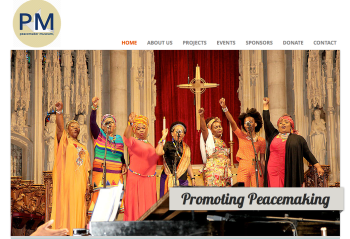




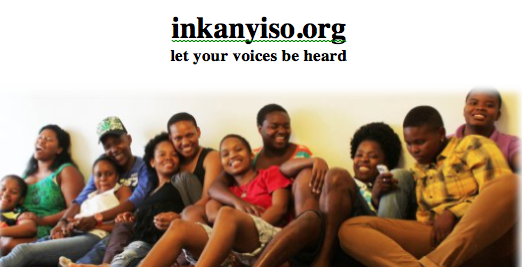







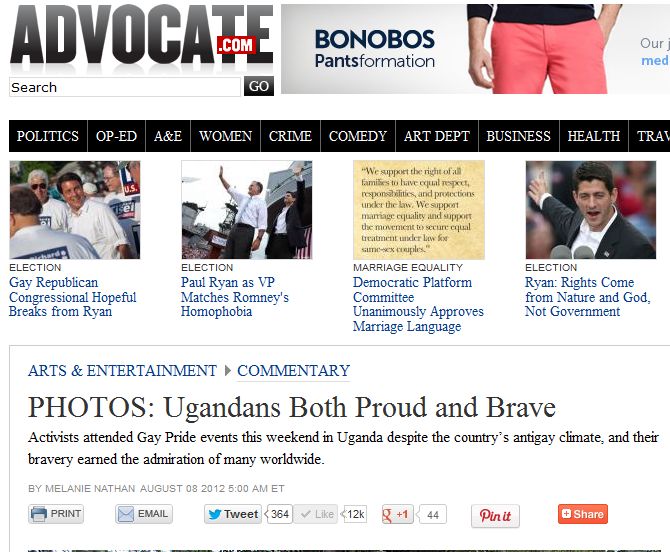
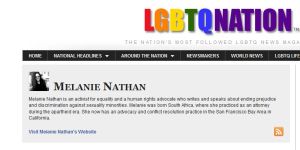
 PoochParkWear customizes hoodies and t-shirts, the good, the naughty, the in between, whether proud or quirky let them be seen. We also offer biker jackets, croc or pleather collars, a variety of collar charms, and our special Zinja beaded collars made by a co-op of HIV-positive South African women, the Sisonke women who weave the beads onto the collars.
PoochParkWear customizes hoodies and t-shirts, the good, the naughty, the in between, whether proud or quirky let them be seen. We also offer biker jackets, croc or pleather collars, a variety of collar charms, and our special Zinja beaded collars made by a co-op of HIV-positive South African women, the Sisonke women who weave the beads onto the collars.

Leave a Reply